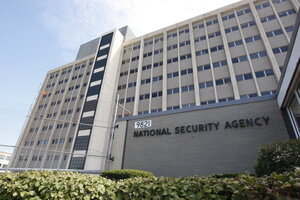Internet companies call for greater transparency from secret court
Internet companies including Apple, Google, and Yahoo called on the government to create greater transparency around secret court information requests

The National Security Agency building at Fort Meade, Md.
Major Internet companies called for greater transparency around national security requests in a joint letter on July 18, 2013.
Charles Dharapak/ AP Photo/ File
A group of twenty-two Internet companies, civil liberties groups, and private investors joined forces, urging “greater transparency around national security-related requests by the US government.”
The request is the first joint statement made by Internet companies implicated in the PRISM surveillance program. Its signatories include AOL, Apple, Facebook, Google, Microsoft, and Yahoo, as well as advocacy groups like the American Civil Liberties Union, Human Rights Watch, and the Electronic Frontier Foundation.
“Having a unified front will really require the administration to take note,” says Electronic Frontier Foundation staff attorney Nate Cardozo. “Obama says he welcomes a debate [on data collection] ... but the debate we are having now is not an informed debate because the Department of Justice is preventing the American people from knowing what is going on."
Notably absent from the list of signatories were all major telephone companies, such as Verizon and AT&T, which also participated in the NSA data collection program, according to secret documents published by the Washington Post and the Guardian.
The first step to having a robust public debate is letting the public know how much data the government is collecting as part of its surveillance programs, according to the letter. If the Obama administration does not take action to make court proceedings more transparent, the letter demands Congress pass legislation that would require comprehensive transparency reporting by the federal government. This would mean that Internet companies would not have to seek permission from the Foreign Intelligence Surveillance Court before publishing the number of FISA requests they received.
There is a “gaping hole” in the transparency reports currently available, says Mr. Cardozo.
Several companies already publish the total number of US law enforcement data requests that they receive each year, however, they do not distinguish between Foreign Intelligence Surveillance Court (FISC) request from any others. After news of the PRISM data collection and surveillance program broke in early June, Facebook, Microsoft, Apple, and Yahoo issued statements to the government requesting permission to release the number of user data requests they received from the FISC.
Google refused to release the number of user data requests it received, instead publishing it’s request to the FISC, asking the secret court to remove the gag order it placed on Google.
“This letter will go a long way towards the companies winning back the trust of their users after the PRISM program revelations,” Cardozo says.
On Monday, the FISC ordered the release of a court decision and accompanying legal briefs from a 2008 case that forced Yahoo to turn over user data to the government as part of the PRISM surveillance program – a sign that both the surveillance program and surrounding transparency debates have been ongoing, and lacking in public input.
Keeping the public out of FISC decisions violates the spirit of the court, says Cardozo.
FISC was created under the Foreign Intelligence Surveillance Act, and signed into law by President Jimmy Carter in 1978.
The court has extended its reach, imbuing itself with powers of constitutional review and addressing important issues that “need to be decided in a public arena,” says Cardozo. The court, he emphasizes, was never meant to decide what constitutes a reasonable search and seizure of information, including Internet browsing data.

